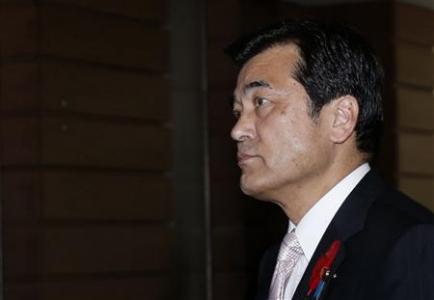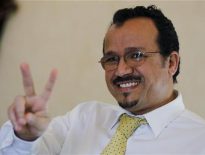(Reuters) – Japanese Prime Minister Yoshihiko Noda appointed as finance minister on Monday a veteran lawmaker expected to follow his line on budget reform and currency intervention in a new cabinet unveiled ahead of an election due in months.

Koriki Jojima, 65, who served as the parliamentary affairs chief for the ruling Democratic Party of Japan (DPJ), will take charge of the world’s third largest economy as it teeters on the brink of recession, hurt by a global slowdown and a strong yen.
Noda, who took office in September 2011 as the Democrats’ third prime minister in as many years, had changed his cabinet line-up twice before. The third reshuffle is seen as a last-ditch effort to boost the Democrats’ sagging ratings.
Analysts said neither Jojima nor the other nine new ministers would have much impact on government policy, with the shake-up mainly designed to give those with greatest voter appeal more prominent roles within the party or cabinet.
Jojima replaced Jun Azumi, 50, an eloquent and experienced campaigner who once worked as a presenter at public broadcaster NHK and who took over a senior party post.
Similarly, photogenic Goshi Hosono, 41, left his post as environment minister to become party policy chief.
Jojima is likely to toe Noda’s line on the need for fiscal reforms given he was instrumental in securing a political deal on the prime minister’s plan to double the sales tax to 10 percent by October 2015.
“Noda clearly eyes elections in reshuffling the cabinet and party line-ups this time,” said political commentator Harumi Arima.
Little is known about Jojima’s views on monetary and currency policies, but he is expected to stick with the government line on the need to work with the central bank to beat deflation and to act firmly against excessive yen gains.
“I doubt if Noda took into account the need to put the right person in the right place,” said Kyohei Morita, chief Japan economist at Barclays Capital. “The fact that he can reshuffle the cabinet so many times in a year indicates that bureaucrats, not politicians, guide policies including currency intervention.”
“As such, I see no change in currency policy whereby authorities give verbal warning when the dollar falls below 78 yen and stand ready to intervene in case of excessive gains,” he said, adding the new minister hardly grabbed market attention.
OPPOSITION SEEN STRONG
Noda retained his foreign and defense ministers in the reshuffle that comes amid heightened tension with China over a long-simmering row over a chain of East China Sea islands administered by Japan but also claimed by China and Taiwan.
Noda told reporters that Japan had no plan to bring the dispute to the International Court of Justice, and that from Japan’s perspective there was no question of its sovereignty over the islands. Japan has taken a separate dispute with South Korea to the court.
Some commentators took Noda’s appointment as education minister of Makiko Tanaka, a former foreign minister and the daughter of Kakuei Tanaka, who normalized diplomatic relations with China four decades ago, as a move to improve ties with Beijing.
Noda told reporters the sole purpose of the shake-up was to improve the functioning of the cabinet.
Opinion polls show the main opposition Liberal Democratic Party, ousted in 2009 after half a century of almost non-stop rule, will likely come first in the election, meaning Jojima’s time in office could be short.
Noda, 55, promised in August to call general elections “soon” in return for backing on his contentious sales tax plan. But the former finance minister remains coy on the timing of the vote.
(Editing by Tomasz Janowski and Robert Birsel)





